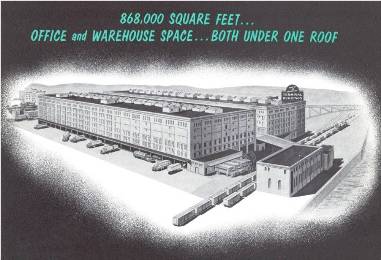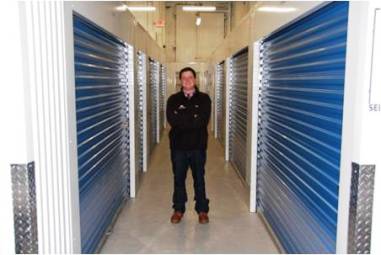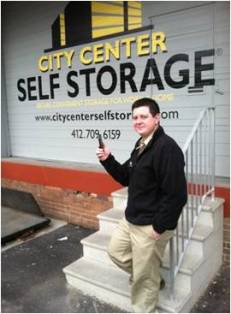The conversion of a 107-year-old building to City Center Self Storage in Pittsburgh is truly a unique story. The author shares why the property was ideal for self-storage, the funding challenges developers faced, and the pivotal role technology plays in the facilitys day-to-day management.
July 4, 2013
By Nick Lackner
When we opened the door to our self-storage facility in November 2012, we initially thought of it as a grand opening. In actuality, it was more of a grand re-opening. Thats because the building was originally built for a different kind of storage: the Pittsburgh Terminal Warehouses. In fact, to my knowledge, City Center Self Storage is the only self-storage facility in a building thats on the National Historic Register. This posed some unique challenges but also a significant number of benefits that are tough to find even with todays new construction.
Good Bones
Our experience is probably unlike that of most other self-storage operators and developers. Many facilities are built from the ground up as new construction. Ours was a conversion project. Built in 1906, the original complex was designed expressly for storage. Perfectly located at the junction of rail, river and roads, Terminal Warehouses (now called River Walk Corporate Centre) instantly became the hub of Pittsburgh storage.

River Walk was the perfect location for us for the very same reasons. Its proximity to downtown make it accessible to the city and suburbs. Three courses of brick construction, high ceilings and thick floors provide natural climate control and built-in security. More than 48 working elevators translated into easy access to the upper floors. It was the perfect building to house our new business. Best of all, it had almost 250,000 square feet of available space!
Onsite Construction Team
Having picked our location, we needed to identify architects, contractors and electricians for the build-out phase. Fortunately, we found one of each right in our building. The architect and contractor are both long-term tenants and have intimate knowledge of the property, its construction and the underlying systems. They literally worked next door and were on site every day, ensuring rapid adjustment of plans and quick decisions.
Likewise, the electrician was on the board of directors for River Walk Corporate Centre and had done most of the electrical upgrades over the years. This talented, committed team was instrumental to our on-time, on-budget opening.
We benefited tremendously from the open floor plan of the building, which included high ceilings and wide hallways perfectly sized for the initial build out of 80 climate-controlled units, with 40 on the first floor and an additional 40 on the fifth floor. All we needed to do was paint the walls and floors and install an intelligent, energy-efficient lighting system that responded to motion and sound.
However, we had to create our office and storefront from scratch, and this is where much of the construction effort went. We wanted a clean, welcoming, modern look for our officea place where customers could not only store with us, but relax, have a cup of coffee and potentially even do some work.
We selected a raw bay on the first floor that faced the street and the flow of traffic. The storefront consists of large windows that were built to match the buildings original turn-of-the-century architecture. To ensure security, our architect cleverly hid automatic steel roll-up doors above the storefront windows that close at night. Our welcoming, IKEA-furnished office and customer-registration workstation are the perfect complement to the 107-year-old historic structure.
 We took advantage of an existing separate room and turned it into a conference room to which we added free Wi-Fi and a coffee maker. On weekends, children play and color while their parents do the heavy work of moving in and out. On weekdays, our mobile business customers use it as a remote office. We even provide free access to the conference room for community groups and neighborhood associations. Its been a great way to increase exposure and become a vital part of the neighborhood.
We took advantage of an existing separate room and turned it into a conference room to which we added free Wi-Fi and a coffee maker. On weekends, children play and color while their parents do the heavy work of moving in and out. On weekdays, our mobile business customers use it as a remote office. We even provide free access to the conference room for community groups and neighborhood associations. Its been a great way to increase exposure and become a vital part of the neighborhood.
A complete security system was installed, with remote camera feeds from the entire facility streamed to a large monitor in the office. Real-time temperature and humidity monitors were placed on both floors, and data is collected and analyzed continuously. A new ADA (American With Disabilities Act)-compliant bathroom was installed, and the original freight elevators were sanded and repainted to match the rest of the office color scheme. We even documented the entire construction process with our iPhones and turned it into a promotional video. Since opening, weve added 25 units and have room and plans for an additional 1,000.
Alternative Funding
We funded our Pittsburgh storage business ourselves. No banks, no outside investors and no loans from family members. If you keep your ears and eyes open, sometimes you can literally find money. Thats what happened to us.
While reading a local Pittsburgh newsletter, we read about the citys Storefront Renovation and Downtown Façade Restoration program. It provided matching funds for business owners who renovated their storefronts. It was a long and winding road, but well worth the journey. The $5,000 grant we were awarded allowed us to invest in a very attractive and welcoming storefront.
Value Engineering
Paying for something yourself gives you a real appreciation of whats important. The difference between nice to have and need to have is now very well-defined for us. It boils down to this: If the expense is an absolute business requirement or will make the customer experience appreciably better, then its a need to have. Everything else is secondary. We call this value engineering, and we do it every day. In fact, we do it many times every day.
Case in point: Local building codes for Pittsburgh storage facilities require a two-tier water fountain for ADA-compliance. Water fountains arent cheap and, based on our experience, arent used that much anymore in the age of people carrying their own water bottles. But building codes have not caught up with that fact, so we went on the hunt.
New water fountains cost $800 or more. We did a local search on Craigslist but didnt find anything in the Pittsburgh area. We went national and used the online website Search Tempest and found one in North Carolina for half the price. A long way from Pittsburgh, but right along the way if driving to Florida for spring break. Timing is everything!
New Technology
 Just because your building is more than a century old, it doesnt mean you cant embrace new technology. Our team makes heavy use of the iPhone every day. Video conferencing, customer-video testimonials, remote-security camera feeds, and remote garage-door opening are all enabled by our teams iPhones.
Just because your building is more than a century old, it doesnt mean you cant embrace new technology. Our team makes heavy use of the iPhone every day. Video conferencing, customer-video testimonials, remote-security camera feeds, and remote garage-door opening are all enabled by our teams iPhones.
In addition, our lighting incorporates the latest technologies. Super-efficient lights use little energy and motion-sensors switch lights off when you leave, eliminating unnecessary energy use. Also, were planning to go completely paperless. The contracting process will soon be all done online through our Web portal. Tenants can select a locker, complete their application and pay for their locker online. Tenants regularly compliment us on the efficiency and sophistication of our operation.
A Final Note
In retrospect, we were very lucky. If youve ever done a restoration, you know renovations of older homes are often twice the price of new construction. We had the same concerns when we approached this project. But we worked the details day in and day out. Every decision was scrutinized, agonized and socialized. Every dollar was optimized to ensure the highest return.
Virtually every evening was filled with conference calls among the partners, reviewing the previous days events and planning for the next. Sure, we were lucky. But luck favors the prepared, and we were very well prepared.
To read more about the use of technology in operating City Center Self Storage and how you can do the same in running your own facility, click here .
Nick Lackner is the founder and general manager of City Center Self Storage in Pittsburgh. To reach him, e-mail [email protected]. For more information, visit www.citycenterselfstorage.com .
You May Also Like





